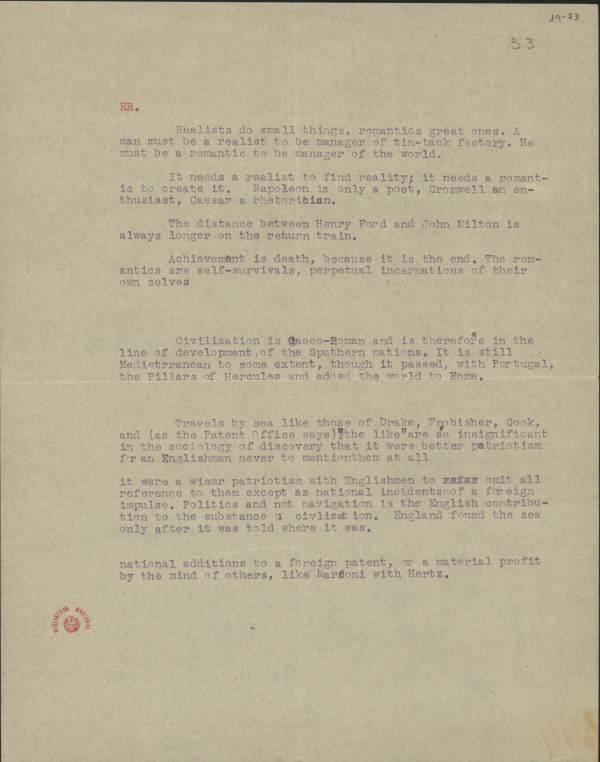Identificação
[19 – 73]
Erostratus.
Realists do small things, romantics great ones. A man must be a realist to be manager of tin-tack factory. He must be a romantic to be manager of the world.
It needs a realist to find reality; it needs a romantic to create it. Napoleon is only a poet, Cromwell an enthusiast, Caesar a rhetorician.
The distance between Henry Ford and John Milton is always longer on the return train.
Achievement is death, because it is the end. The romantics are self-survivals, perpetual incarnations of their own selves {…}
Civilization is Graeco-Roman and is therefore in the line of development of the Southern nations. It is still Mediterranean to some extent, though it passed, with Portugal, the Pillars of Hercules and added the world to Rome.
Travels by sea like those of Drake, Frobisher, Cook and (as the Patent Office says) “the like” are so insignificant in the sociology of discovery that it were better patriotism for an Englishman never to mention them at all[1] except as national incidents of a foreign impulse. Politics and not navigation is the English contribution to the substance of civilization. England found the sea only after it was told where it was.
{…} national additions to a foreign patent, or a material profit by the mind of others, like Marconi with Hertz.
[19 – 73]
Heróstrato.
Os realistas fazem coisas pequenas, os românticos fazem coisas grandes. Um homem deve ser um realista para ser um gerente de uma fábrica de tachas. Deve ser um romântico para ser gerente do mundo.
É necessário um realista para encontrar a realidade; é necessário um romântico para a criar. Napoleão é apenas um poeta, Cromwell um entusiasta, César um retórico.
A distância entre Henry Ford e John Milton é sempre maior no comboio de volta.
O cumprimento é a morte, porque é o fim. Os românticos são sobreviventes de si próprios, encarnações perpétuas de si próprios {…}
A civilização é greco-romana e está, portanto, na linha de desenvolvimento das nações do sul. É ainda mediterrânea até certo ponto, embora tenha ultrapassado, com Portugal, os Pilares de Hércules e acrescentado o mundo a Roma.
As viagens por mar como as de Drake, Frobisher, Cook e (como diz a Repartição de Patentes) “afins” são tão insignificantes na sociologia da descoberta que seria mais patriotismo para um inglês nunca os mencionar de todo, excepto enquanto incidentes nacionais de um impulso estrangeiro. A política e não a navegação é a contribuição inglesa para a substância da civilização. A Inglaterra descobriu o mar apenas depois de lhe dizerem onde estava.
{…} acréscimos nacionais a uma patente estrangeira ou um ganho material para a mente dos outros, como Marconi com Hertz.
[1] it were better patriotism for an Englishman never to mention them at all /it were a wiser patriotism with Englishmen to omit all reference to them\
Classificação
Dados Físicos
Dados de produção
Dados de conservação
Palavras chave
Documentação Associada
Publicação integral: Fernando Pessoa, Heróstrato e a Busca da Imortalidade, edição de Richard Zenith, Lisboa, Assírio & Alvim, 2000, pp. 152-153; 204.


